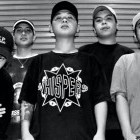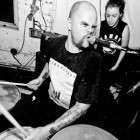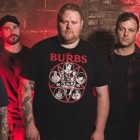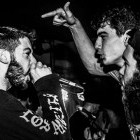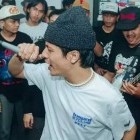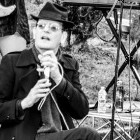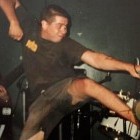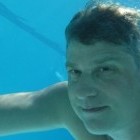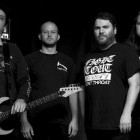
Growing up in South Florida, Chris Hornbrook was an integral part of the local hardcore and punk scenes of the '90s and '00s. As a member of Poison the Well, his drumming style helped inform the metalcore sound that developed during the era.
After recording five studio albums and a handful of EPs, Poison the Well went on hiatus in 2010. Since then, Hornbrook has become a member of both Senses Fail and Big Black Delta, two bands with very different sounds. It's a testament to his versatility behind the drum kit that the 33-year-old can jump from one style of music to the other with such ease.
With Senses Fail in the middle of a tour with Bayside and Man Overboad, I chatted with Hornbrook about his career and current life in California.
I always like starting off my interviews by going back to the musician's childhood.
Yeah, I grew up in Fort Lauderdale, Florida. My dad is a bass player and was active for many years before I was born. So, growing up I had music all around me. He was always playing rock, blues, pop, etc. on the family stereo when I was young. My dad always wanted me to play guitar, so when I was around 7 my parents signed me up for private lessons. I can honestly tell you I remember nothing that I learned from those two years [laughs]. It's all a blur. When I was about 12, somehow I decided that I wanted to give drumming a go. Thankfully, I did, and it stuck.
Were you already listening to hardcore and metal by the time you started playing drums?
No, I didn't get into punk and hardcore until I was in high school. Growing up I was indoctrinated into your normal popular music that your family grew up listening to: The Beatles, Pink Floyd, Led Zeppelin, and so on. I really took a liking to Queen. I was obsessed with Roger Taylor when I was just starting to learn to drum. That's probably where my love for Queen comes from today, only now I have a better understanding of how amazing they were with songwriting. That band had some serious musicianship and incredible chemistry with one another. That doesn't happen every day.
You went on to play with guitarist Ryan Primack in Poison the Well, but you guys played in a band together before that, right?
Yes, the band was called Last Minute. It was punk rock, in the vein of Ignite and old AFI. I replaced their drummer at the time that they didn't really like as a person. I think he tried to beat one of them up and was just an overall bully towards them. At one point, one of the dudes poured piss into his kick drum [laughs]. Anyway, they were looking for a new drummer and I befriended the singer. I was able to talk him into talking to the other guys about letting me in. Ryan Primack was one of those dudes.
How did you come to join Poison the Well?
I was the first dude that they spoke to about drumming. I don't think they knew anyone else, so by default, I was asked. Ryan Primack was putting together a hardcore band with our old singer, Aryeh Lehrer, and asked me if I would be interested in playing with them. It was sold to me as a side project to do for fun. I didn't have a ton of experience at the time with anything heavy or aggressive, so I looked at it as being something new and exciting. I'm all about expanding your horizons and doing new things.
SEE ALSO: Best Albums from the New Wave of Shoegaze
Poison the Well's first full-length, The Opposite of December, is considered to be one of the most influential albums in the metalcore realm. Since that came out all the way back in 1999, how do you feel about the album all these years later? Do you understand why a lot of people gravitated towards it?
Thank you for the kind words, I appreciate it. Yeah, 1999 was so long ago! It's hard for me to relate to it nowadays just simply because I don't listen to that type of music anymore, and I feel like we've surpassed that record musicianship- and songwriting-wise with our later releases. If you ask any band or individual musician what's their favorite record they've done, more than likely it's going to be the most recent, because it's the most current version of them. I do remember the excitement involved with writing it and how stoked we were. I think the most we wanted out of it was to have kids come see us and sing along. I could have never imaged 16 years later that people would still be talking about it and care. That's very humbling.
What was your involvement with the Florida band Keepsake?
I was friends with dudes in the band back in the day and was asked to record a session for them when their drummer either quit or left for school. I forget which one it was. I was 16 at the time and had no idea what I was doing [laughs]. We just jammed a few times and then went in and recorded, I think about four songs. I was never officially in the band or played any shows with them as a performing musician. I just helped them out when they were in need.
In 2002, Poison the Well's second album, Tear from the Red, hit stores. I don't have the sales figures in front of me, but I remember the album selling well for Trustkill. Did you guys feel a difference when you were touring that record? Were show turnouts noticeably better than they were the previous year?
Sort of. It was strange because no one initially seemed really excited about that record. Trustkill seemed underwhelmed and lots of kids weren't stoked because it was a far departure from The Opposite of December. It took a bit of us touring and doing support runs to really start building things up. The songs translated more energetically live and we toured as much as we possibly could. It wasn't until right before we went on to record You Come Before You that I really started to feel it become more solid and could see the growth.
The band parted ways with Trustkill for your next album, You Come Before You, in 2003, and signed on with Atlantic Records. How did that deal transpire and who was the A&R agent who signed you?
The funny thing about leaving Trustkill was we had two firm records with them and then an EP, but our contract had a time clause in it. By the time we were done touring on Tear from the Red, that time period was fast approaching, which released us from our deal with them. It was pretty straightforward and not complicated. I don't remember anyone being too happy with Trustkill, as I know a lot of bands had made public over the years, and wanted to move to something bigger that had more resources. Atlantic was most interested and understood what we wanted to do and where the band wanted to go. We were signed by Tom Storms, he was our dude at Atlantic, but it was through an imprint called Velvet Hammer. The dude running that was a guy named Beno. We worked closely with both of those guys throughout our time there.
SEE ALSO: 2014 interview with Josh Grabelle (Trustkill Records, Bullet Tooth).
For the album, you brought in Pelle Henricsson and Eskil Lövström, two Swedish producers who had previously worked with Refused. Was the label resistant to that decision at first? One would have expected them to want you guys to go with a bigger name producer.
They let us do whatever we wanted, which was awesome. We were like kids in a candy store, creatively speaking. We had no restrictions and the label never fucked with us. I think they thought we knew something that they didn't [laughs]. We had put out two records on an indie label that did great for the time, and built up a decent-sized following within the hardcore world, so that gave us more leverage to get what we wanted when we signed with them. One of those things was total creative control over the music and artwork.
You Come Before You was recorded in Sweden and in Los Angeles. One of the places you tracked at was Sound City, a studio that a lot of folks learned about through Dave Grohl's documentary of the same name.
Dude, it was so fucking cool! A lot of records that I grew up listening to were made there, and even records that my dad loved were made there as well. I remember walking into the place and being in awe. I had never really been in a legit studio prior to that. Studio 13 was a great spot, but it wasn't the full deal like Sound City was. Working there was one of those moments which you'll pretty much never forget.
SEE ALSO: Best Orange 9mm Songs
Many people made a big deal about Poison the Well's musical shift from Tear from the Red to You Come Before You, but listening to both albums today, the stylistic changes don't feel all that out of left field to me. What's your take on that?
I tend to agree with you. We were growing up and wanting to do different things. People in the band's musical tastes were expanding and we wanted the music we were creating to be a representation of that. We kind of saw that we were going to be the band that never made the same record twice and we embraced that. It always did puzzle me why people got so bummed when we first released new records, as they never seemed super off the mark. We weren't making improv jazz or turning into a world music outfit. Whatever we did always sounded like Poison the Well. It may have been a bit more metal or a bit poppy or a bit... country, but always retained our sound. Who knows?
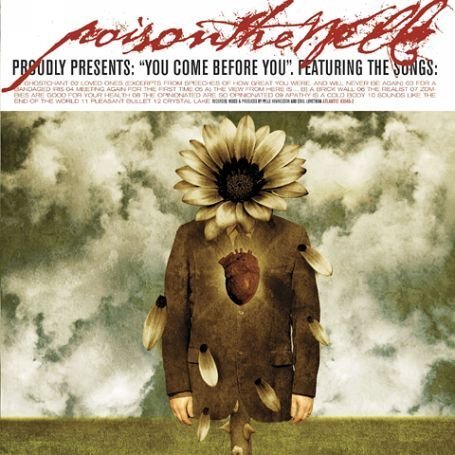
The band and Atlantic Records severed ties before your next album. Do you look back at the partnership as a mistake, or was it an overall positive experience for the band?
You live and you learn. Maybe we should have understood the game a bit more and realized that we would have had to compromise a bit and give some. I don't think anyone was willing to do that at the time; It was very much our way or the highway. With that being said, going to a large indie probably would have made more sense with that attitude. But, I don't regret signing with Atlantic. Sometimes you only get one chance to do something, and we shot long and far. I'm not one for regrets in life and I like to see things to the end. We did it and it didn't work. Cool, now I won't have to spend the rest of my life wondering, "What if...?" You know?
You signed on with Ferret Records and released your fourth studio album, Versions, in 2007. That one might be my favorite Poison the Well record. There's a lot going on in a lot of the songs, but they're still memorable. That's something a lot of so-called "metalcore" bands fail miserably at.
Thank you. At that point, I wouldn't have considered us a metalcore band, though we retained the heavy parts but became more of a noisy rock band. I actually feel really good about it, though I still hate the mix and master on it. The process was long, different, and it wasn't exactly pleasant at times, but that reflected in the music. I think we were able to use the frustration and being upset to our advantage in being creative. Versions needed to happen and come out the way it did. I found it was very therapeutic.
Poison the Well's most recent album, 2009's The Tropic Rot, is another gem. I think a lot of people slept hard on that one.
Thank you! I think so, too. I feel like we were on the popular decline hard at that point. Things were changing in music and those waves that you catch when new things are happening and you can build what you already have more were being missed on our part. All we really wanted to do was make cool shit that we were stoked on and that's not how things work. You need to be aware of everything and be in control of that.
How do feel about the album today?
In terms of The Tropic Rot, it's my favorite Poison the Well album. I think that all the songs are great, the performances were great, and the sound is the best out of all the Poison the Well records. I don't know if people are stoked on that record now. I know it takes a few years for people to get your new stuff. Touring was rough, we had to do tours we weren't super stoked to do and felt like we had to be on tour all the time. In all reality, we should have been pickier with our approach to touring, but once again, you live and you learn.
In 2010, Poison the Well made an announcement that you would be going on hiatus. Was it a case of being burnt out, or were there other elements at play?
Yeah, being burnt out and being tired of it. I had slowly been moving away from heavy music and felt like I needed a change in my life. All I had known for 12 years was Poison the Well and I needed to know more of something different. I knew that it would be kind of hard, but hey, you have to start somewhere.
SEE ALSO: 2015 interview with Brian Fair (Shadows Fall, Overcast, Death Ray Vision).
Around that time you moved to Southern California to pursue other projects. Was your plan to get into the session musician ecosystem?
Not really. I know the session game is something that a small group of people do, and what I would do would be limited and mostly for friends. I just wanted to move, meet new people, and try to get into the touring musician world more as a hired gun. I had been fried on being part of the company and always getting paid last. I know the deal, if you're in the band you're poor unless you do really well. It sucks to tour your ass off and make no money.
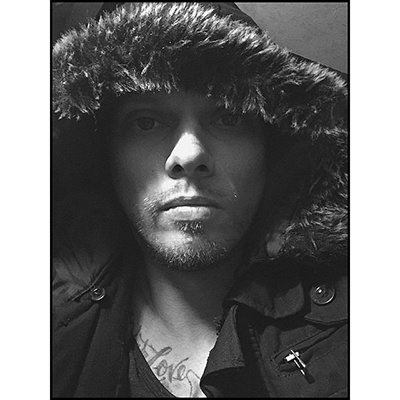
You played drums in Mellowdrone singer Jonathan Bates' solo project, Big Black Delta. What was it like to play in a more electronic-based kind of style, and are you still playing with Bates?
Yeah, I am and I love it. It's so nice and a great change of vibe music-wise. I've been able to learn so much more from working with him, and meet a ton of new people that I would have never met playing with Poison the Well or Senses Fail. It's part of the variation that I've been looking for out of music.
2014 saw you join Senses Fail as a touring member. Since then, you and the band recorded a new album, and signed with a new label. Are you in the band for the long haul?
Senses Fail has become my priority because of the schedule the band has for the next year or two with touring and other obligations. Consistency is great and needed in my life when it comes to work. With that being said, I will remain a hired drummer, as I work with lots of other bands and don't want to be committed to just one—aside from Poison the Well, of which I am still an active member, which will never be full-time and never conflict. If Poison the Well plans on doing more things, it will be when everyone can do it.
You've been touring since you were a teen. Now that you're in your 30s and have many more responsibilities back at home, do you find touring to be a completely different thing to you compared to Poison the Well's early years? How do you balance home life with touring?
It's become a different thing, for sure. It's not just "get in the van or bus and go" anymore. There are a lot more factors involved for me now that have to be present for me to want to work with a band or artist. Surprisingly, touring has been able to retain the fun and exciting elements for me. That's one of the reasons why I still do it. I love to drum and I love to travel. You can't beat this occupation, in my opinion.
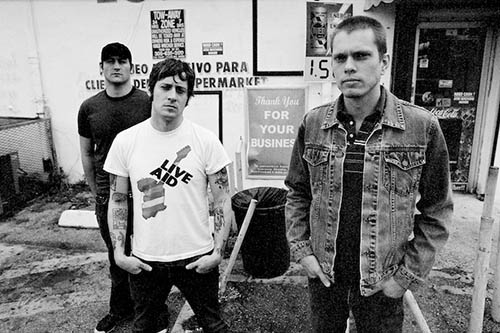
Poison the Well is playing a one-off show at this May's Skate & Surf Festival in New Jersey. How did the reunion come about and what can we expect in terms of the material you'll cover?
It all started from an offer that our booking agent had received from Skate & Surf. Jeff and I had been talking for a while about trying to do something as Poison the Well, but we weren't sure if Ryan was still interested. We would never do anything as a band if it didn't involve all three of us. After a nice, long conference call, we all were on the same page and wanted to move forward. Not sure of material yet, as we haven't started to practice yet. I'm sure we'll cover all the important material, and maybe slip a few deep cuts in.
Are there any other musical projects you'd like to plug? Have you been doing any session work as of late?
I just finished up the new Senses Fail record, Pull the Thorns from Your Heart. There are a few things that I'm working on in my spare time, one is a rock thing with a few friends of mine back in California. Another is a studio project with Beau from Saosin. We're just writing some songs and having fun. No deadline, no release date. It will be a "happen when it happens" kind of thing.
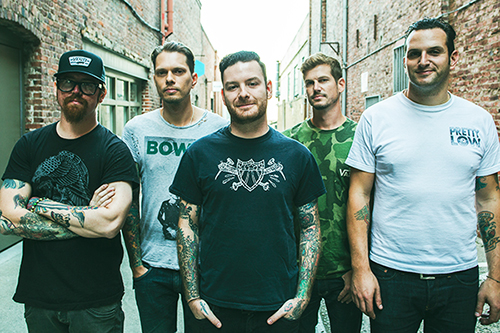
What do you do with your spare time outside of touring and recording? Do you have any hobbies?
I live with my girlfriend by the beach. It's the best and she rules. I spend a lot of my time doing photography and exploring that part of my creative side, learning more about the universe and how we think it works, and how sound works, as it relates to what I do for a living. I'm not a sports guy or a big party dude. I like to keep it mellow and have continual intellectual growth. That's very important to me.
***
Follow Chris Hornbrook on Twitter and head over to his official website to find out more about his various projects.


